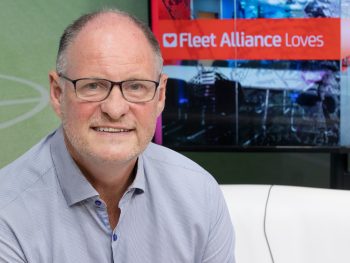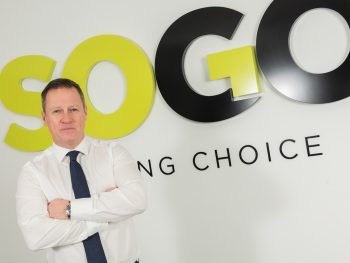COP26: The fleet sector’s views on the opportunities for transport
With COP26 now in progress, Fleet World asked some of the fleet sector’s leading lights for their views on what should be done to tackle the climate crisis in terms of transport.

Spencer Halil, chief commercial officer, Alphabet (GB)
Spencer Halil, chief commercial officer, Alphabet (GB)
“As COP26 gets underway, the switch to electric vehicles has been highlighted as one of the immediate goals that countries must deliver on to secure global net zero by mid-century. However, the Government has not capitalised on recent opportunities to provide the clarity and certainty needed around the topic of electrification to enable companies to make this important step. With no update on future tax rates for customers, nor a clear path for how long electric vehicle incentives will remain in place, businesses are unable to plan for an electric future with any confidence. This is on top of the challenges they are already navigating around suspected road pricing increases on the horizon and ever-changing costs for drivers in city centres.
“Businesses urgently need better long-term certainty from the government across all these areas to enable them to commit to sustainability investments for their fleets and support wider UK climate targets. And with charging infrastructure remaining a concern for many businesses, we also need to see the recently announced investment from the Autumn Budget delivering reliable and accessible public charge points with unified access. This will be a key factor in empowering decision-making for both consumers and businesses alike when choosing their next vehicles.”

Sandra Roling, Climate Group’s head of transport
Sandra Roling, Climate Group’s head of transport
“Over a hundred EV100 member companies worldwide have already committed to shift their fleets of over 5 million vehicles to electric by 2030, alongside installing charging infrastructure. As COP26 gets underway it’s vital that governments match this ambition with positive policy action.
“This year’s COP with its special emphasis on clean transport as one of the UK Presidency’s priorities provides a major opportunity to build momentum in this space. That’s why our RouteZero platform is geared around showcasing rising electromobility ambition from fleet users, manufactures, cities, states and investors around the world, and give governments the confidence to adopt ambitious national electrification strategies to reduce their national emissions.
“Above all, we need policy clarity. Governments should set clear targets for vehicle sales to become zero emissions, ideally by 2030 for light-duty and 2040 for medium and heavy duty. These need to be underpinned with year-on-year implementation mechanisms to stimulate an adequate supply of zero emission vehicles, and we recently welcomed the UK Government’s ambition in this area with the announcement of a ZEV mandate.
“In addition, governments should introduce or extend incentives to bridge the cost gap in adopting EVs until widespread price parity is reached.
“Ambitious policy targets are also needed to ensure adequately, easily accessible EV infrastructure, that is both user-friendly and interoperable, and can keep up with demand from fleet owners as well as private users.”

Paul Gilshan, Tusker’s CEO
Paul Gilshan, CEO at Tusker
“As a proudly net-positive contributor to the environment, having been carbon-neutral for over 11 years, Tusker is fully committed to aiding motorists in the switch to affordable, new, electric and sustainable vehicles. We are entirely supportive of the COP 26 summit and will be following the developments on the Paris Agreement and the UN Climate accord closely in the coming days.
“While we have already reduced the average emissions of our fleet by 65% with over a third of our fleet now pure electric, we are well on our way to achieving our own goal of a zero-emission fleet by 2030, but are aware that governmental support will be crucial to the private sector in helping bolster the infrastructure which will be needed to accompany the wider switch to electric and zero-emission vehicles.”

Robert Gordon, CEO at Hitachi Capital UK
Robert Gordon, CEO at Hitachi Capital (UK) Plc
“The COP26 summit is a pivotal moment for world leaders to come together and accelerate the global response urgently required to address climate change.
“The net zero economy is very capital intensive and finance companies have a key role to play in the distribution of capital and in developing partnerships with innovative companies seeking to deliver sustainable change.
“We all have an important role to play by assessing how we can adapt our business strategy to make a material impact. At Hitachi Capital UK, we are actively evolving our operation to direct the flow of finance to sectors of the economy which help to reduce greenhouse gas emissions.
“We’re already helping to accelerate the adoption of electric vehicles powered by solar energy, in partnership with Gridserve. This forms part of our aspirational commitment to have 20% of our assets directly connected to climate action and affordable clean energy by March 2025.”

Barney Goffer, UK product manager at Teletrac Navman
Barney Goffer, UK product manager at Teletrac Navman
“Infrastructure to support charging for EVs and the right financial incentives/penalties simply have to be created to make going green viable.
“Electrify transport, invest in electrification infrastructure, incentivise green mobility and a taxation on burning fossils to power mobility – our atmosphere can no longer be used as a dustbin for GHGs.”

Andy Bruce, CEO at Fleet Alliance
Andy Bruce, chief executive officer of Fleet Alliance
“The Fleet Alliance offices are just round the corner from where the COP26 conference is taking place so we have been following the build-up closely, and playing our part in the drive to reverse climate change. We have signed up to EV100, pledging to switch our 30,000 fleet to zero emission by 2030.”
Fleet Alliance has also been supporting the climate event with its own COP26 website news feed, highlighting some of the wider issues of decarbonisation.
“I think it’s crucial that we see fleet electrification in a broader context, beyond the financial savings that fleets and drivers can enjoy by going green,” says Bruce.
Fleet Alliance has also worked in partnership with SSE Energy Solutions and Nissan to provide an electric Leaf to support Scottish Renewables’ Year of COP.
“We’ve looked to offer wider knowledge as well as practical help to draw attention to climate change,” Bruce adds.

Karl Howkins, managing director of Sogo
Karl Howkins, managing director of Sogo
“The fleet industry’s journey to net zero is well underway and accelerating. At Sogo we’ve invested to ensure that moving to an electric vehicle is as easy as possible, whether that’s leasing a vehicle for a month, carbon offsetting or access to charging networks.
“I would encourage the Government to build on this momentum with new investment. It’s essential to maintain the tax incentives that are driving change and ramp up funding for infrastructure to ensure that an electric future is pleasurable and productive.”

















